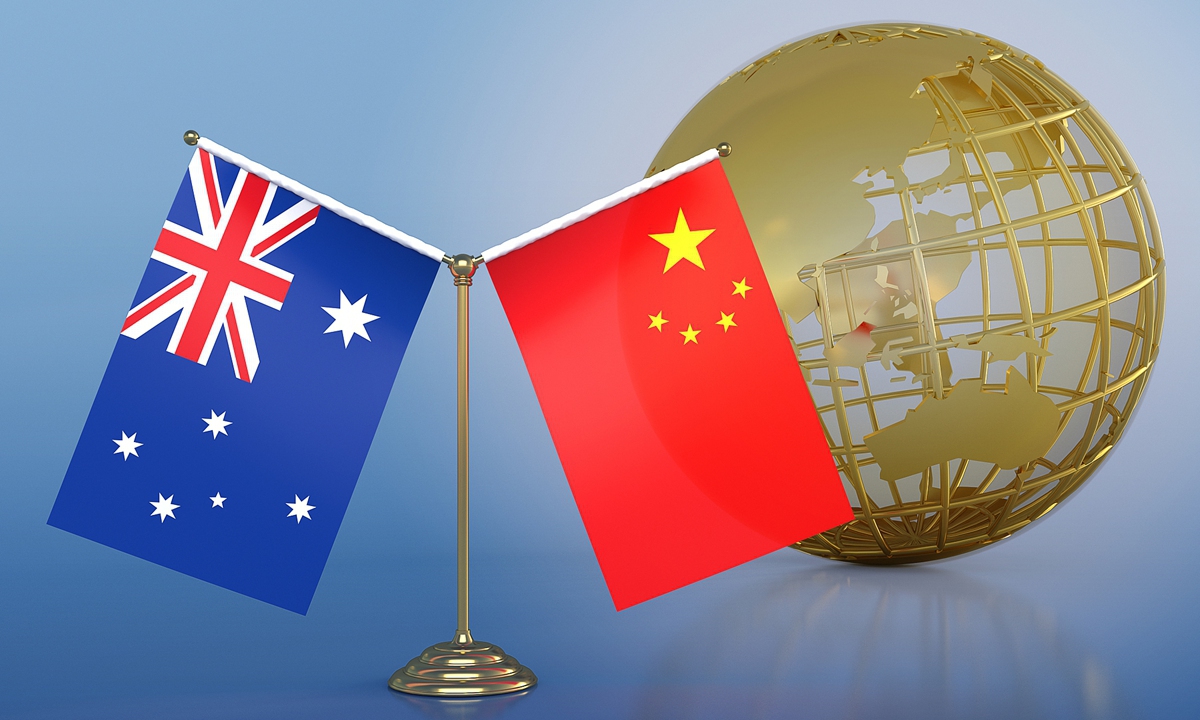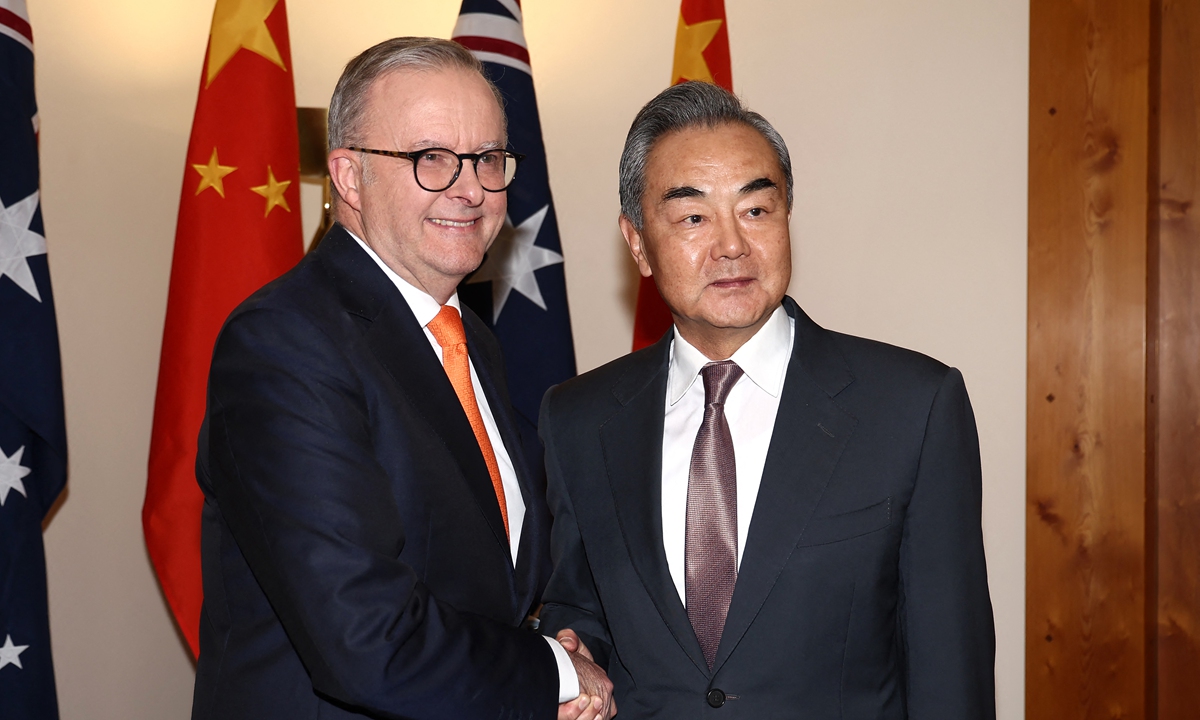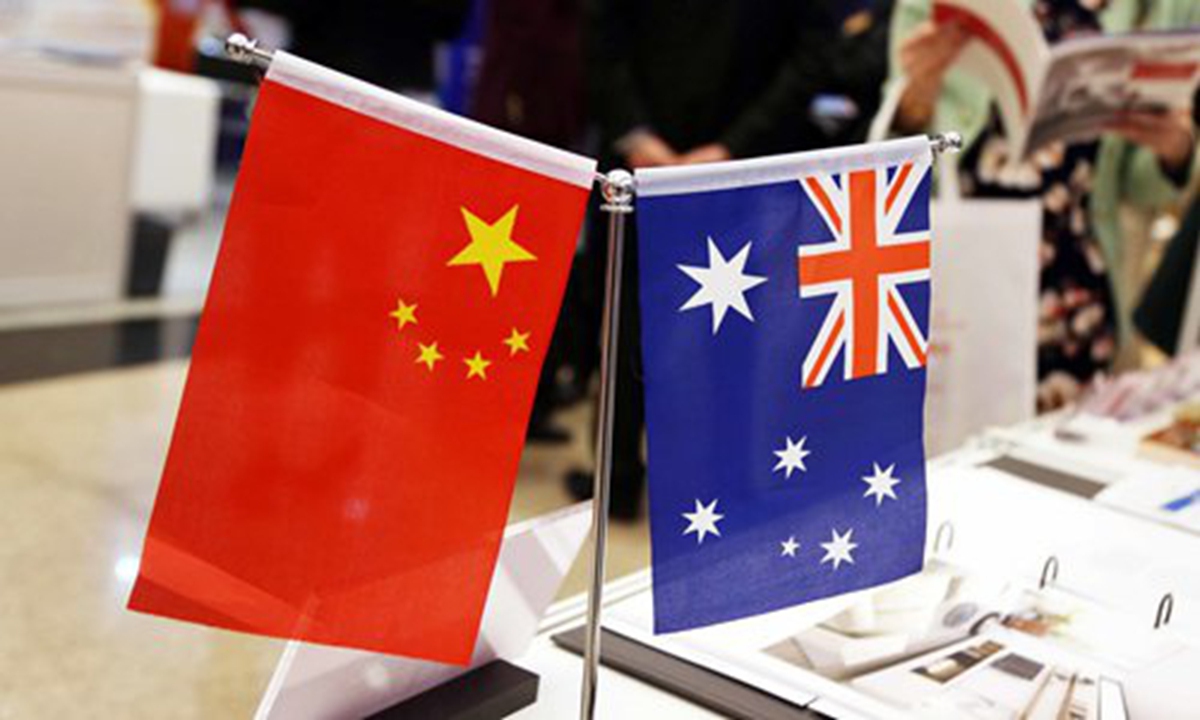Exclusive: Improvement in China-Australia bilateral relationship gives businesses greater confidence about seizing trade, investment opportunities: AustCham

China Australia Photo: CFP
Improvements in the China-Australia bilateral relationship give Australian companies greater confidence about seizing trade and investment opportunities in this market, Vaughn Barber, AustCham China Chair, told the Global Times in an exclusive interview on Friday, with good prospects expected as bilateral relations welcome more positive signals with the visit of China's Foreign Minister Wang Yi to New Zealand and Australia, which concluded on Thursday.Bilateral trade has welcomed more positive recovery momentum amid the high-level meetings and interactions at the governmental and business level, following a meeting by the countries' top leaders in Bali, Indonesia in November 2022.
Responding to a comment on the significance of the visit by Wang, who is also a Member of the Political Bureau of the Communist Party of China Central Committee and Director of the Office of the Central Commission for Foreign Affairs, to the further thawing of bilateral economic and trade relations, Barber said that the state of the bilateral relationship between China and Australia is one of the top factors impacting decisions by Australian companies when it comes to their business in China.
"Such engagements are crucial for fostering positive momentum in bilateral relations, which is good for businesses on both sides," Barber said, adding that it is also important because of the positive signal it sends to tourists, students, consumers, companies, institutions and potential business partners in China.
Meanwhile, AustCham will be watching reports carefully for updates on progress in areas of collaboration that were announced during the Australian Prime Minister's visit to China last November, on the removal of the remaining trade impediments, and on improvements in visa arrangements for Australians traveling to China on business, Barber said.
There is rising speculation over a possible lifting of Australian wine tariffs, which some media and experts expect to happen very soon. In response, a number of Australian winemakers are adopting proactive strategies, such as increasing shipments to China's Hong Kong Special Administrative Region in February, in anticipation of the removal of tariffs on their products in the Chinese mainland, their largest market.
"We are looking forward to the removal of the wine tariffs which impacted about A$1.1 billion ($717.35 million) in sales to China. The Australian wine industry is eager to return to serve the Chinese market while continuing to serve the markets that were developed while the tariffs have been in place," Barber said, noting that this will be a win-win outcome for Chinese consumers and Australian wine producers.
The Chinese Ministry of Commerce (MOFCOM) began reviewing anti-dumping and countervailing duties on Australian wine as of November 30, 2023. A five-year series of anti-dumping and countervailing tariffs on Australian wines was imposed on March 28, 2021.
If wine tariffs are removed, it will be another major update after the resurgence of key Australian export commodities, including barley, wool and coal, which have further propelled trade growth.
MOFCOM has been taking an active approach regarding the wine case. Ministry spokesperson He Yadong told a regular press conference on February 22 that the ministry will advance the investigation process in accordance with the law, and conduct a comprehensive review of the claims and evidence of all interested parties.
Wine is just one important component of China-Australia economic and trade cooperation, which is highly complementary between both sides.
Looking ahead, Barber said that they expect that China will only become more important as Australia's trading partner of choice as the complementarities between the economies continue to increase.
He gave the example of the complementarity between Australia and China in the journey toward net zero emissions, which presents a unique business opportunity that can further strengthen bilateral ties.
"While Australia offers abundant resources crucial for renewable technologies and pioneering research in sustainable practices, China brings manufacturing scale, technological expertise, and a vast market," the chamber chair said, adding that collaboration between Australia and China in areas related to decarbonization of the economy can bring benefits to both countries and accelerate the global transition to a net-zero future.
While some Western media have intensified their doubts targeting Chinese economy, foreign businesses remain confident of China's market potentials, including AustCham, acknowledging that China provides significant business opportunities and growth potential for Australian companies despite uncertainties.
China's high-quality development priorities outlined in the Government Work Report for 2024 are also inspirational for Australian companies in China to further tap into market potential, Barber said.
In addressing specific market potential that Australian companies in China are keen to explore or capitalize on in the near future, Barber named several key sectors - resources and energy, agriculture and food production, healthcare and eldercare, education and products and services which support the decarbonization of the economy.
In addition to the potential in decarbonization cooperation, Barber highlighted agricultural trade, with China's rising consumer market being a key driver for growth.
"High-quality Australian agricultural produce and premium packaged foods and beverages continue to enjoy success in China's growing consumer market," Barber said.
As in prior years, premium Australian food and beverage and consumer products were out in force during the China International Import Expo. "Australian produce and products enjoy an outstanding reputation, particularly in key aspects such as quality, safety, and environmental sustainability. This reputation translates into a strong demand among Chinese consumers," he said.
Moreover, China's emphasis on food security and safe, green agricultural products opens opportunities for Australian agricultural technology companies and food producers.
As part of its commitment to a green and low-carbon economy, China is investing in clean energy sources and technologies, which Barber also sees the potential for deeper cooperation.
"Australian companies in the clean energy sector, such as those involved in LNG, hydrogen energy, and energy efficiency technologies, could find significant opportunities for trade and investment," he said, citing the example of how Australia's LNG exports can support China's transition to cleaner energy sources, while Australian firms can also collaborate with Chinese partners on hydrogen projects and energy efficiency initiatives.



